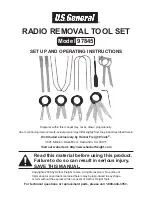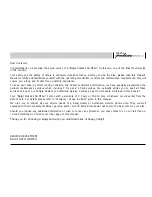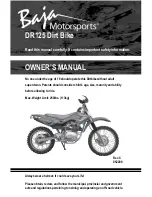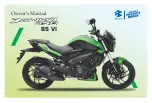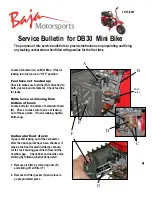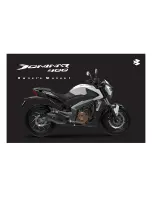
CLIMBING HELMET
A GENERAL
Please read these instructions thoroughly before using this product and follow all the information
contained within. Failure to observe these instructions can lead to a reduction in the protection this
product provides.
The product is a mountaineering helmet, primarily designed for impact protection against rock fall and
offering protection to climbers during a fall. It is essential that you familiarise yourself with this product
before using it for the first time.
Please note: mountaineering and climbing are dangerous sports which may lead to unforeseable risks.
You are personally responsible for every action and decision you take. You should acquaint yourself with
the related risks before undertaking these activities. SALEWA recommends that you seek proper training
from professionals (such as mountain guides or climbing schools) before undertaking any mountain-re-
lated activity. It is important to become familiar with rescue operations and how they are carried out
safely and correctly. The manufacturer declines any responsibility in case of improper or wrong use.
Make sure all the components in your protection equipment are certified.
This product is made in conformity with PPE regulation (EU) 2016/425.
You can view the EU Declaration of Conformity under www.salewa.com.
The product meets category II for personal protective equipment (PPE).
B INSTRUCTIONS FOR USE
Only use the product for the purpose for which it was constructed and never burden it beyond its limits.
: Danger to life
: Risk of injury
: Correct use
This product protects from rock fall and impacts. It corresponds to the standard EN 12492:2012.
Mountaineering helmets are headwear primarily intended to protect the upper part of the wearer’s head
against hazards which might occur during activities carried out by mountaineers; In particular, these
helmets are designed to absorb the energy produced during impact by reducing the intensity of the
trauma suffered by the head. However, wearing a helmet cannot prevent death or permanent disability.
The correct use is shown in diagram B.
WARNING:
We have not shown all possible misuses.
ADJUSTING THE HELMET
WARNING:
A helmet can only provide optimum protection if it is properly and correctly fitted to match
your individual head size and shape. If this is not the case, DO NOT USE THE HELMET. Swap it for another
size or another model. A helmet that does not properly fit your head, or which is too loose, will signifi-
cantly impair the helmet’s protective capability.
Illustration 1 - Adjusting helmet fit to your head size:
System with adjusting wheel:
First, expand the headband to its maximum dimensions via the adjustment wheel (turn anti-clockwise)
and put the helmet on. Then turn the wheel clockwise until the headband sits snugly to your head. To get
the perfect fit, you can slide the headband vertically up or down at the back.
System with adjustable band:
Loosen both tension straps around the forehead to their fullest extent and put the helmet on. Then, pull
the tension straps closed until the headband sits snugly but comfortably on your head. For optimum
positioning, you can slide the headband vertically up and down at the back.
Illustration 2 – Adjusting the chin strap: The chin strap should sit at the sides of your head and is fas-
tened with the buckle under your chin. For a snug and comfortable fit, the strap length can be adjusted
under your chin. To position the strap properly at the sides of your head, shift the divider and adjust
the strap length to fit your head shape so that the strap sits below your ears on both sides. The straps
must not cover your ears. When the buckle is closed, the chin strap should not apply any pressure on
your Adam’s apple.
Illustration 3 - Fixing a headlamp: To fix a headlamp to your helmet, slide the headlamp’s strap through
the flexible slots on the exterior shell and hold it in place with the elastic band on the back of the helmet.
Position the lamp on the front of the helmet, on the forehead.
Illustration 4 – Magnetic catch: To lock: bring both parts of the catch together so that they lock in place
against each other. A loud click informs you the magnetic catch is locked. To open: hold the end of the
bottom part of the catch tightly and pull it firmly away from the upper part.
Plug buckle: To close: Push both buckle ends one into another so that they slot together. The plug buckle
closes with a loud click. To open: Press the buckle laterally.
Illustration 5 – Function test: When the chin strap is fastened and the headband is flat to your head,
ensure that the helmet is sitting level horizontally and that it cannot slip forwards or backwards.
If the helmet slips too far forwards, slide the divider backwards. If the helmet slips too far backwards,
slide the divider towards the front.
Ensure that the buckle has closed correctly.
C SAFETY INSTRUCTIONS
Before use, carefully check each product part. Diagram C
Always check the condition of your helmet first before using it. Check all straps, attachment parts and
make sure that the adjustment elements on the headband function properly.
Make sure that the helmet shape is not deformed and that there is no other visible damage.
WARNING:
Please note that your helmet has been designed to absorb the maximum amount of force
during impact. This is effected by the helmet deforming, which can cause it to incur damage or be
rendered unfit for use. However, such damage is not always visible to the naked eye.
For this reason, the helmet must be replaced immediately following any significant impact. Examples of such
impact are a climber fall or as a result of rock or ice fall, even if no damage is visible.
The same is also true for helmets with Multi Impact qualities.
Extreme temperatures (below -20°C/-4°F and above +35°C/95°F), cleaning materials, hydrocarbons
and paint, solvents, adhesives/glues or stickers can all alter the physical characteristics of the helmet,
and therefore may only be used with the manufacturer’s instructions or approval.
WARNING
·If you are in the least bit suspicious as to the product’s saftey, you should replace it immediately.
D LIFESPAN
The lifespan of the product is dependent on a number of factors, such as the manner and
frequency of use, UV exposure, moisture, ice, affects of weather, storage conditions, and dirt
(sand, salt, etc.). Under extreme conditions, the lifespan can be reduced to a single usage,
or even less, if the equipment has suffered damage (for example during transport) before ever being
used. Please note: Products manufactured from synthetic fibres are subject to ageing even when not
used. This ageing depends mainly on environmental conditions as well as the impact of UV light.
SALEWA explicitly recommends replacing any safety equipment (PPE equipment) after a maximum of
10 years from the date of production, regardless of whether the product has been used regularly or not.
Extreme and very demanding usage can even lead to a lifespan of less than one year.
E CLEANING, STORAGE, TRANSPORT AND SERVICING
See diagram E for guidelines on correct storage and care.
STORAGE
You should store your helmet somewhere dry, cool and well ventilated, away from direct sunlight. Avoid
storing the helmet near any heat sources, nor anywhere where it is exposed to direct or persistent UV
rays or extreme temperatures. Ensure that your helmet never comes into contact with aggressive
chemicals such as battery acid, solvents or salt.
CLEANING AND MAINTENANCE
Heavy soiling on your helmet can be washed off with mild soap but do not use any chemical cleaning
products or solvents. Rinse your helmet thoroughly after cleaning and dry it all over with a towel. Do
not carry out any repairs or modify your helmet yourself. Any improper modifications you make to your
helmet can adversely affect its protective capabilities. If you have any questions regarding replacement
parts for your helmet, please contact your SALEWA specialist dealer.
When maintaining, cleaning and disinfecting your helmet, only use products which are safe for both the
product and its intended user.
The product may neither be modified nor repaired.
TRANSPORT
Protect your helmet from any mechanical wear or damage, solar radiation, chemicals or dirt. The best
approach is to get a protective bag for your helmet and/or a special storage and transport container.
Your helmet is delivered in a robust box which can be used for this purpose.
F IDENTIFICATION LABELS
:
Manufacturer’s brand
PIUMA 3.0, PURA, TOXO 3.0, VAYU 2.0, VEGA:
Product name
Helmet for mountaineering:
Product designation: Climbing Helmet
CE:
Confirms adherence to the Regulation (EU) 2016/425
Notified body performing the EU type examination (module B):
A, B, D, E: SGS Fimko Oy (N.B. 0598)
P.O. Box 30 (Särkiniementie 3)
00211 Helsinki Finland
C:
Alienor-Certification (N.B. 2754)
21, rue Albert Einstein - ZA du Sanital
86100 Châtellerault France
EN 12492:
The standard with which the product complies
:
This confirms that the product has been manufactured in accordance with the UIAA norm.
size x cm:
Size
x g:
Weight
Made in xxxxx:
Country of origin
xxAmmyy:
Information on traceability
xx:
Index (Reference to current drawing)
A:
Production batch
(A = first batch of the production month)
mm:
Month of manufacture (01 = January)
yy:
Year of manufacture (13 = 2013)
:
Pictogram indicating that the instruction manual must be read.
SALEWA - Oberalp S.P.A., - Via Waltraud Gebert Deeg Strasse 4, I-39100 Bozen - Italy:
Brand, name
and address of manufacturer
G GUARANTEE
Salewa - Oberalp S.P.A. guarantees all of its products from new against defects in workmanship or
materials, unless the product has been worn out, misused or abused as determined by our examination.
This guarantee is in addition to your statutory rights which remain unaffected. Salewa - Oberalp S.P.A.
reserves the right to modify without notice the design and specifications of products described in these
instructions. All weights, dimensions and sizing specifications where quoted are nominal.
[EN]























